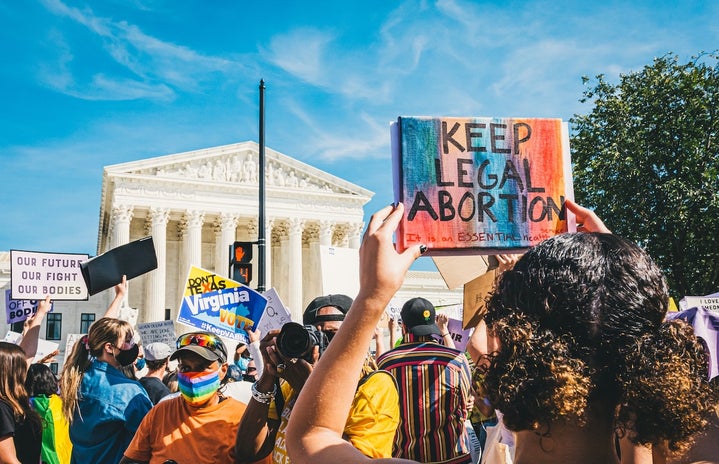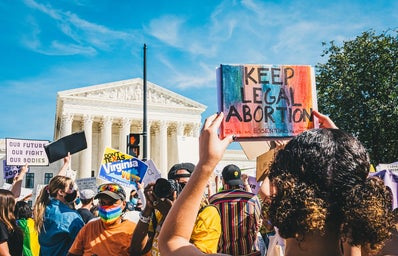In a historic decision on June 6, the Supreme Court officially reversed Roe v. Wade, removing the constitutional right to abortion, which was maintained for nearly half a century.
Justices Samuel Alito, Clarence Thomas, Neil Gorsuch, Brett Kavanaugh and Amy Coney Barrett voted to overturn Roe v. Wade, while Justices Stephen G. Breyer, Sonia Sotomayor and Elena Kagan voted to uphold the ruling. Justice Alito wrote in favor of overturning the ruling, “It is time to heed the Constitution and return the issue of abortion to the people’s elected representatives” and called the original decision “egregiously wrong and deeply damaging.”
While it was leaked by Politico in May that this was likely to happen, abortion rights in about half of the states will be rolled back immediately with additional restrictions to likely follow. Abortion will be unavailable in many regions of the country, mostly in the Midwest and South. Many legal experts claim that this decision will create new questions for other courts about how to apply the specific language of the final ruling to individual state laws.
According to NPR, prior to SCOTUS overturning the ruling of Roe v. Wade, communities of color were already disproportionately impacted by abortion restrictions, and they will continue to bear the burden. Not all states report racial and ethnic data concerning who gets abortions, but based upon those who do (29 states and D.C.), the Centers for Disease Control and Prevention has also discovered that a disproportionately high share are people of color. Black women had the highest rates of abortions with 23.8 abortions per 1,000 women. Hispanic women had 11.7 abortions per 1,000 women, and white women had the lowest rate of 6.6 abortions per 1,000 women. Furthermore, 59.6% of these women were in their 20s.
“Both Black women and Latinas have higher rates of unintended pregnancies than white women. 60% of people obtaining abortions are people of color.”
Since abortion rights are both an economic and health justice issue, many communities of color will feel the socioeconomic effects of this decision. Several factors may impact one’s decision to receive an abortion, including health care access and quality, financial support, and desire to have a child, according to ABC News. Those living in poverty, who experience a lack of health care access and racism within the health care system, will face the most difficulties in receiving abortion care.
According to research by professors at the University of Michigan, racial and ethnic minorities often experience lower-quality health care than white people. The health care system still fails people of color when such factors like income, age, condition, and insurance are comparable. Anu Mandapati, an award-winning Global Diversity, Equity, and Inclusion (DEI) thought leader, tells Her Campus that Black women “aren’t listened to when they share symptoms and side effects and have endured more pain because many healthcare practitioners ridiculously believe they have a higher pain tolerance. The states that have already banned or [are] most likely to ban abortion access have a greater population of people of color. Both Black women and Latinas have higher rates of unintended pregnancies than white women. 60% of people obtaining abortions are people of color.”
These inadequate and unacceptable health systems result in worse health conditions. According to the Department for Health and Human Services, Black people are at higher risk for heart diseases, stroke, cancer, asthma, and diabetes. Abortions are a vital aspect of health care for people of color because Black and Hispanic women are more likely to endure health complications during pregnancy and childbirth than white women, according to the Blue Cross Blue Shield Association.
Abortion bans will force people into povery or debt, compounding financial disparity that already exists among people of color.
In 2020, Black women died due to maternal causes at almost three times the rate of white women — 55.3 deaths per 100,000, compared to 19.1 deaths per 100,000, respectively. The rate for Black women also increased nearly 26% from the previous year. A 2021 study conducted by the University of Colorado, Boulder estimated that the abortion ban may increase maternal deaths among Black women by 33%.
Abortion bans will also force people into povery or debt, as childbirth and pregnancy can cost thousands of dollars. This will compound financial disparity that already exists: According to the 2019 census, Black and Hispanic people are 1.8 and 1.5 times more likely to experience poverty than white people. Furthermore, Latinas earn 57 cents while Black women earn 65 cents for every dollar a white, non-Hispanic man makes.
Elizabeth Benson Forer, CEO of the Venice Family Clinic, a nonprofit community health center, tells Her Campus, “The Supreme Court’s majority decision to overturn Roe restricts the rights not only of women but all Americans. By ending women’s and their families’ constitutional right to determine if, when, and how they will raise their families, this dreadful decision will jeopardize women’s lives and health. The court’s decision also puts at risk a whole host of other rights, including contraception, same-sex marriage and transgender rights.” It’s also important to note that women aren’t the only ones who receive abortions.
Even though it feels like our own country is attacking us, continue fighting and making your voices heard.
Prior to Friday’s ruling, abortion was still difficult for many Americans to access. Abortion access was already limited to those in states with stricter restrictions, and these restrictions force people to travel out of state, according to the Guttmacher Institute. People may have to travel hundreds of miles to states where abortions will remain permissible. Those of lower socioeconomic classes, who are disproportionately people of color, may not be financially able to afford to travel. This makes obtaining an abortion expensive and even more difficult for some.
It is crucial to support anyone with the ability to get pregnant during this scary and daunting period. It is also vital to continue supporting and donating to abortion funds, if you have the means to do so, like local and independent abortion clinics, so everyone no matter their gender, race, ethnicity, age, or socioeconomic status may have access to safe abortions. We must all continue to educate ourselves about abortion rights and the Supreme Court processes by talking to others and doing our own research. The decision to overturn Roe v. Wade also indicates that rights like gay marriage, access to contraception, and sexual autonomy and privacy may soon be “reconsidered” in court, according to Justice Clarence Thomas’s concurring opinion. Even though it feels like our own country is attacking us, continue fighting and making your voices heard, so everyone in the United States can have equal rights.


